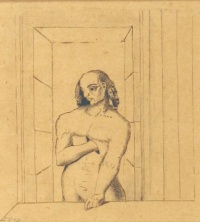Mind
From The Art and Popular Culture Encyclopedia
| Revision as of 14:59, 21 November 2009 Jahsonic (Talk | contribs) ← Previous diff |
Revision as of 07:54, 10 June 2011 Jahsonic (Talk | contribs) Next diff → |
||
| Line 1: | Line 1: | ||
| + | [[Image:The Heart Has Its Reasons by Odilon Redon.jpg |thumb|right|200px|''[[The Heart Has Its Reasons]]'' (c.[[1887]]) by [[Odilon Redon]], a phrase from the ''[[Pensées]]'' ([[1669]]) by [[Blaise Pascal]]]] | ||
| [[Image:Theatre from Ars Memoriae by Robert Fludd.jpg|thumb|right|200px|''[[Ars Memoriae]]'': The [[Theatre]] ([[1619]]) - [[Robert Fludd]]]] | [[Image:Theatre from Ars Memoriae by Robert Fludd.jpg|thumb|right|200px|''[[Ars Memoriae]]'': The [[Theatre]] ([[1619]]) - [[Robert Fludd]]]] | ||
| {{Template}} | {{Template}} | ||
Revision as of 07:54, 10 June 2011

|
Related e |
|
Featured: |
Mind is the aspect of intellect and consciousness experienced as combinations of thought, perception, memory, emotion, will and imagination, including all unconscious cognitive processes. The term is often used to refer, by implication, to the thought processes of reason. Mind manifests itself subjectively as a stream of consciousness.
Theories of mind and its function are numerous. Earliest recorded speculations are from the likes of Zoroaster, the Buddha, Plato, Aristotle, Adi Shankara and other ancient Greek, Indian and, later, Islamic philosophers. Pre-scientific theories grounded in theology concentrated on the supposed relationship between the mind and the soul, our supernatural, divine or god-given essence. Most contemporary theories, informed by scientific study of the brain, theorize that the mind is an epiphenomenon of the brain which has both conscious and unconscious aspects.
Which attributes make up the mind is much debated. Some argue that only the higher intellectual functions constitute mind, particularly reason and memory. In this view the emotions—love, hate, fear, joy—are more primitive or subjective in nature and should be seen as different from the mind as such. Others argue that various rational and emotional states cannot be so separated, that they are of the same nature and origin, and should therefore be considered all part of what we call the mind.
In popular usage mind is frequently synonymous with thought: the private conversation with ourselves that we carry on "inside our heads." Thus we "make up our minds," "change our minds" or are "of two minds" about something. One of the key attributes of the mind in this sense is that it is a private sphere to which no one but the owner has access. No one else can "know our mind." They can only interpret what we consciously or unconsciously communicate.


